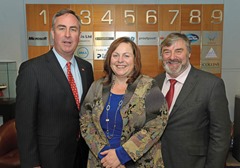Innovation and global vision
 US Special Representative for Global Partnerships Andrew O’Brien talks exclusively to Peter Cheney about how science and tapping into new markets advances economic development.
US Special Representative for Global Partnerships Andrew O’Brien talks exclusively to Peter Cheney about how science and tapping into new markets advances economic development.
Investing in science education and a determined focus on emerging markets are two wise choices to make in a changing world. That’s the key message from a senior State Department official during a visit to Belfast to promote business and academic links with the US.
Andrew O’Brien is the Special Representative for Global Partnerships, reporting to Secretary of State John Kerry. The Boston native worked in Kerry’s Senate office and on his presidential campaign in 2004. He took up his current post in May last year.
His office is a “gathering place” for contacts in “the outside world” of business, civil society, universities and hospitals. This trip is the first in a series of ‘partnership opportunity delegations’ which bring a variety of people together to think up fresh ideas.
From his travels to date, he sees an “incredible promise in the world’s youth population” and adds: “We’d all be very wise to think about opportunities for young people – no matter where they are – and that’s true in the US, that’s true here in Northern Ireland and it’s true all across the world.”
The United States has a “very agrarian” school system which needs reform in order to compete with growing populations across the world. To his mind, the key question is: “How are we giving our next generation an advantage?” The answers, O’Brien proposes, lie in good primary-level education and affordable access to higher education.
He explains: “That’s something we need to take a good long look at because I think, in the US in particular, it’s becoming prohibitive to go to college.” Students need to be educated “for the future” and this ties in with his discussions about science, technology, engineering and maths. Those disciplines are “constantly changing” and staying on top of different countries’ approaches “gives you the opportunity to find out what’s new, what’s cutting edge.”
He highlights Worcester Polytechnic in Massachusetts which is represented in the delegation to Belfast. Worcester uses teaching materials from NASA in its after-schools programmes for 6-10 year olds. Getting pupils interested in science at this level can change their career tracks further down the line and this, in turn, is good for global competitiveness.
O’Brien sees his trip as “a continuation of a conversation that we started last summer” on his first visit to Belfast, which focused on diasporas. The State Department is keen to encourage diaspora groups, regardless of nationality, to look at how they can help their home countries.
He recalls: “We had a pretty heavy discussion about education, about the economy, science and technology, so I left here with the idea that we needed to keep the conversation going and start to move towards some action items on how we can make an impact here.”
Irish-Americans had a “very active” interest in Northern Ireland during the conflict and the peace process but can now be “more active” in education, arts, culture and the economy.
The delegation includes the President of Sister Cities International, Mary D Kane, who will discuss how to “enhance existing sister city relationships and maybe build some new ones.” Belfast’s counterpart is Nashville, Tennessee. Other potential outcomes could include more internships for young people in the US.
Turning to the American economy, he comments that “recovery was a bit of a political football in our country” but it was also “always a long-term plan, wasn’t supposed to be an immediate thing.” O’Brien adds: “I think President Obama faced a lot of criticism for that. I think he stayed to the message. I think he stayed to the task.”
Falling unemployment figures indicate progress. The number of jobless Americans stood at 10.3 million in December, down from 12.3 million a year previously. The stock market, in his view, is heading upwards. Indeed, the 2008 crisis highlighted how Wall Street impacts citizens: “These are people’s pensions, these are people’s mortgages that build these economic mechanisms – and they’re already trending the right direction.”
We’re speaking two days after the President’s State of the Union address, themed around opportunity, action and optimism. O’Brien remarks: “That’s been a message of his since he came into office, about widening the grasp of opportunity for people, and I think he’s made it very clear the other night that he’s going to spend his final years in office making good on that.”
Visitors to Washington DC, though, are often struck by the gap between rich and poor. A short walk south from Capitol Hill leads into a deprived working class neighbourhood. Income inequality, it is put to him, remains a large and long-running problem.
“Washington is no different from any other city in the US and any other city in the world to be quite honest,” he responds. “People in the lower income bracket are in cities for a reason because there’s access to housing, there’s access to public transportation, there’s easier access to jobs. I don’t think Washington’s alone in that. I think those are social and economic dynamics you see in any city.”
Obama’s second term administration has increased its diplomatic activity in the Far East: the so-called ‘pivot to Asia’. Asked how Europe fits into that worldview, O’Brien notes that its relations with America go back hundreds of years and form “inextricable links”.
Demand for the pivot is explained by Asian nations’ growing populations and economies and “the way that our finances are connected with them.” He prefers to focus on a “continually growing” global economy: “All of us are wise to look at where the emerging populations and the emerging markets might come from because our economies will all be inextricably linked to those economies some day.”
www.state.gov/partnerships






